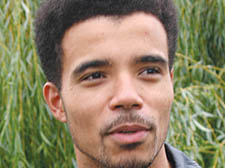|
|
 |
| |

Akala |
History teachers: change the record!
Mobo Award-winner says black history lessons damage students’ self-esteem
MS Dynamite’s award-winning musician brother has called for a shake-up in the way black children are taught at school.
Kingslee Daley, who uses the stage name Akala, believes history lessons are too focused on the slave trade and that the curriculum reinforces stereotypes about “black savages”. Mr Daley, 23, a former Acland Burghley School pupil from Kentish Town, said lessons about ancient African civilisations could improve self-esteem among students.
He warned Black History Month could be making the problems facing black students worse. His second album, Freedom Lasso, comes out in October, coinciding with Black History Month.
He said:“Black History Month is not a waste of time, but if it’s just about slavery and Malcolm X then it is fuelling the problem. All I was taught at school was that we were slaves. I don’t think people take time to realise how psychologically damaging that is.”
Mr Daley followed in his sister’s footsteps last year by winning a prize at the prestigious Mobo Awards.
He warns that if young black students are not given a balanced account of their cultural heritage they are more likely to grow up with low self-esteem and a lack of expectation.
“When Africans were enslaved, the justification was that black people were not human – they were seen as similar to monkeys,” Mr Daley said. “Your average person doesn’t think that now, but they still don’t realise Africa has some of the oldest societies in the world. In Timbuktu in Mali there are medieval stone cities still standing. There are more pyramids in Sudan than in Egypt.”
He linked violent crime within the black community to an institutionalised lack of expectation at school, which results in students’ low self-esteem.
Although Niomi MacLean-Daley – to use Ms Dynamite’s real name – has so far enjoyed more commercial success than her younger brother, his new album could change things.
He has criticised the negative values promoted by hip-hop and rap idols such as 50 Cent.
“I don’t see a gangster,” he said of the multi-millionaire artist who has built his reputation on songs about misogyny, homophobia and the cult of ‘thug life’.
“I see a confused, scared little boy who doesn’t know how to be himself. I know a lot of men like that.
“I feel very frustrated that hip-hop – a powerful communication tool from ancient African times – is being used to talk s**t.
“That bothers me.”
But he stressed that rap heroes were not the prime suspects when it came to analysing why black pupils were doing badly at secondary school.
He believes that between the age of seven – when he says Afro-Caribbean children do well academically – and 13, something else is going wrong.
He said blaming music was an easy way out for the media – and warned people needed to focus on more pressing problems such as poverty, family breakdowns and lack of self-esteem.
He said: “If you believe in yourself you’re not going to go around selling crack.” |
 |
|
| |
| Your Comments: |
| |
| |
| |
|
 |
|